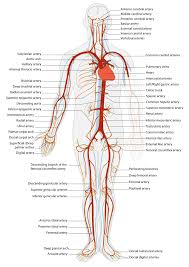记忆方法
将“artery”与“art”组合来记忆。想象“art”是一幅描绘人体内部血管结构的艺术作品,而“artery”是其中一条主要的大血管,像艺术作品中的一条显著的“art”路线。这样的视觉联想有助于记忆这个单词。
以上内容由AI生成, 仅供参考和借鉴
中文词源
artery 动脉,干线,要道
来自aorta,大动脉。
英语词源
- artery
-
artery: [14] Artery is a direct borrowing from Latin artēria, which in turn came from Greek artēria. This appears to have been based on the root *ar- ‘lift’. A parallel formation is thus aorta ‘main coronary artery’ [16], which comes from Greek aortē, a derivative of aeírein ‘lift’ – again ultimately from the root *ar-.
The notion underlying aortē seems to be that the heart was thought of by the ancients as in some sense suspended from it, as if from a strap (Greek aortés ‘strap’), so that it was ‘held up’ or ‘raised’ by the aortē (the aorta emerges from the top of the heart). The Greeks, of course, did not know about the circulation of the blood, and since arteries contain no blood after death it was supposed that their function was conveying air.
Hence Hippocrates’ application of the term aorta to branches of the windpipe, and the use of artery for ‘windpipe’ in English up until as late as the mid 17th century: ‘[The lungs] expel the air: which through the artery, throat and mouth, makes the voice’, Francis Bacon, Sylva sylvarum 1626.
=> aorta - artery (n.)
- late 14c., from Anglo-French arterie, Old French artaire (13c.; Modern French artère), and directly from Latin arteria, from Greek arteria "windpipe," also "an artery," as distinct from a vein; related to aeirein "to raise" (see aorta).
They were regarded by the ancients as air ducts because the arteries do not contain blood after death; medieval writers took them for the channels of the "vital spirits," and 16c. senses of artery in English include "trachea, windpipe." The word is used in reference to artery-like systems of major rivers from 1805; of railways from 1850.
权威例句
- 1. A muscular spasm in the coronary artery can cause a heart attack.
- 冠状动脉的肌肉痉挛可能导致心脏病。
- 2. He had an operation last year to widen a heart artery.
- 去年他接受了一个扩张心脏动脉的手术。
- 3. He almost bled to death after the bullet severed an artery.
- 子弹穿过动脉,他失血过多几乎性命不保。
- 4. Blood enters the kidneys via the renal artery.
- 血液通过肾动脉流进肾脏。
- 5. We couldn't feel the changes in the blood pressure within the artery.
- 我们无法感觉到动脉血管内血压的变化.
